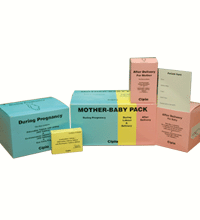
Mother-baby pack by Cipla
Towards the end of November 2010, Cipla, a Mumbai-based pharmaceutical major, took a step ahead in revolutionizing HIV/AIDS treatment and reducing the incidence of mother-to-child transmission of HIV/AIDS by developing a first-of-its-kind 'Mother-Baby Pack' in collaboration with UNICEF and other partners. The Mother-Baby Pack contains the entire range of antiretroviral drugs and antibiotics required by an HIV-infected mother starting from the 14th week of her pregnancy until the 6th week after delivery.
Developed in line with the latest World Health Organization (WHO) guidelines on Prevention of Mother-to-Child Transmission (PMTCT), the Mother-Baby Pack is a color-coded take-home kit with simple graphics to help mothers identify the different sets of drugs each to be taken during pregnancy, during labor and breastfeeding, covering the entire period when the transmission can occur. Also, the pack contains drugs for the new born baby.
The product won the BioSpectrum Asia Pacific Bioscience Industry Product of the Year for 2011.
On making a landmark contribution in the fight against HIV/AIDS, Dr Y K Hamied, chairman, Cipla said, "We were approached by UNICEF to produce this pack for the PMTCT program. The specially designed Mother-Baby Pack will increase adherence and play a pivotal role in the total prevention of mother-to-child transmission of HIV/AIDS." The core team involved in the development of this product were Dr Jaideep A Gogtay, medical director, Dr Viraj Mehta , medical services and Mr Prashant Sisodia, regional manager for Africa and Institutional Business.
Informs Sisodia, "The initiative took place two years back and with the launch of this pack, we have entered 10 countries and slowly intend to move to other countries as well."
UNICEF had approached Cipla with this idea keeping the African nations in mind. The pack has already been launched in Kenya, Cameroon, Zambia and Lesotho. Says Dr Gogtay, "The disease is widely prevalent in the Sub-Saharan African countries, especially the mother to child transmission of the disease. So, the UN decided to come up with this pack from an African perspective."
With the launch of the Mother-Baby Pack that costs $70 and covers a period of 12 months, now an HIV positive mother-to-be even in the remotest corner of the least developed nations would have daily access to essential PMTCT drugs during her entire term of pregnancy in the convenience of her own home.
Informs Dr Mehta, "The mother-to-child transmission of the virus can happen at three stages - during gestation, labor and delivery or post delivery during breast feeding."
"Basically, we have appropriate intervention designed at preventing transmission at each of these three stages. We have a pictorial and graphically designed booklet, color coding of the boxes within the pack which explains all the steps so that even an illiterate person can understand how to use the pack," adds Dr Mehta. The pack is also available in languages like French because a large majority of the population in West Africa are French-speaking people.
The most important benefit of the Mother-Baby pack, as pointed out by doctors is that it would drastically help in reducing the number of child deaths due to AIDS.
The idea behind the pack was also to help avoid the need for pregnant women from rural areas to travel. "The problem with many women in rural areas is that once they are diagnosed as HIV positive, they do not turn up for follow-up check-ups for many reasons. So in this case, at that point of testing she is counseled and handed over this pack by the doctor," adds Dr Mehta.
The Mother-Baby pack team has already approached the Indian Government, making them aware about the pack. Says Dr Gogtay, "The Indian Government follows an international set of guidelines for treatment of pregnant women diagnosed as HIV positive. These guidelines are undergoing changes. Currently, there are two available forms of treatment. While Option A is the treatment using the Mother-Baby pack, the other option is administering pregnant women with three drugs called the triple therapy. So we will have to wait for the decision of the Government towards its choice."
Patient-compliance inevitably remains a challenge for the team. Before the pack was produced, a feasibility study was conducted by the UNICEF as to whether such a pack would be acceptable amongst pregnant women, with the result being positive. The UNICEF is now conducting similar feasibility studies in the African regions.
Cipla has more plans in the pipeline to make these drugs easily available to the common masses. Today, almost 1 out of 3 HIV-infected patients in the least developed countries is on Cipla drugs and the team claims that they will continue to work towards its commitment of 'None shall be denied.




